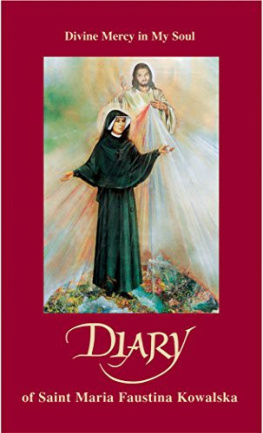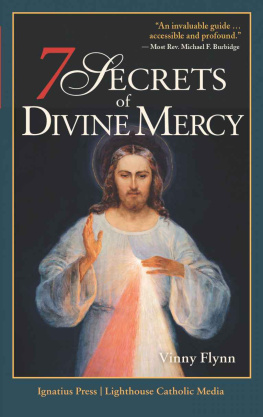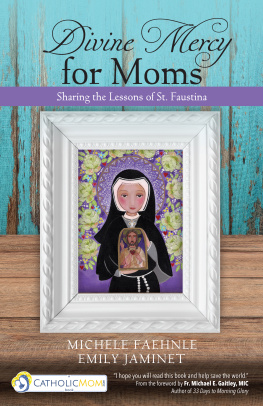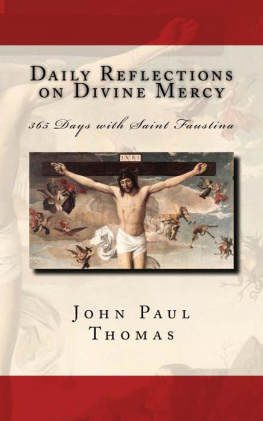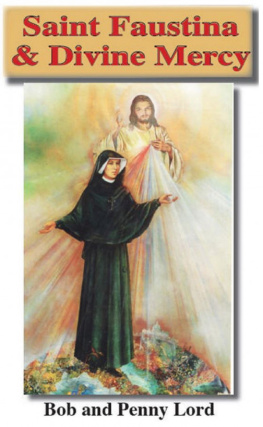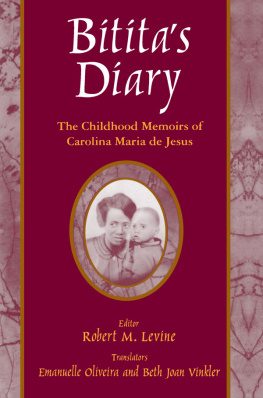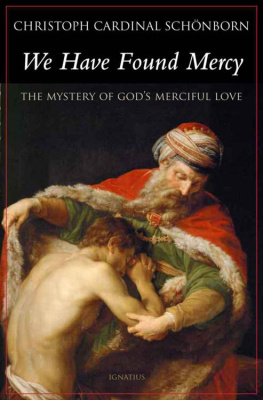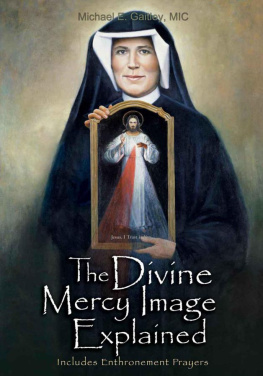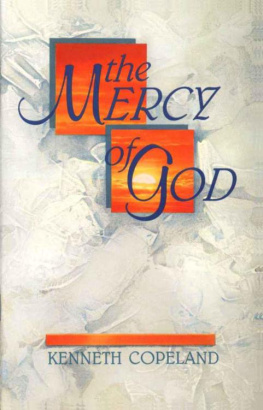Maria Faustina Kowalska - Diary: Divine Mercy in My Soul
Here you can read online Maria Faustina Kowalska - Diary: Divine Mercy in My Soul full text of the book (entire story) in english for free. Download pdf and epub, get meaning, cover and reviews about this ebook. year: 0, genre: Religion. Description of the work, (preface) as well as reviews are available. Best literature library LitArk.com created for fans of good reading and offers a wide selection of genres:
Romance novel
Science fiction
Adventure
Detective
Science
History
Home and family
Prose
Art
Politics
Computer
Non-fiction
Religion
Business
Children
Humor
Choose a favorite category and find really read worthwhile books. Enjoy immersion in the world of imagination, feel the emotions of the characters or learn something new for yourself, make an fascinating discovery.
- Book:Diary: Divine Mercy in My Soul
- Author:
- Genre:
- Year:0
- Rating:4 / 5
- Favourites:Add to favourites
- Your mark:
- 80
- 1
- 2
- 3
- 4
- 5
Diary: Divine Mercy in My Soul: summary, description and annotation
We offer to read an annotation, description, summary or preface (depends on what the author of the book "Diary: Divine Mercy in My Soul" wrote himself). If you haven't found the necessary information about the book — write in the comments, we will try to find it.
Diary: Divine Mercy in My Soul — read online for free the complete book (whole text) full work
Below is the text of the book, divided by pages. System saving the place of the last page read, allows you to conveniently read the book "Diary: Divine Mercy in My Soul" online for free, without having to search again every time where you left off. Put a bookmark, and you can go to the page where you finished reading at any time.
Font size:
Interval:
Bookmark:
The diary of [Saint Maria] Faustina is the record of her life experience - the journey of her soul. She was graced by a special communion with God, and the diary expresses her conviction that communion ought to be the center of our lives. Since the 1940s, the Marians of the Immaculate Conception, St. Stanislaus Kostka Province, have shared this conviction and have undertaken the promulgation of Gods mercy throughout the world, particularly as it has been proclaimed by [Saint] Faustina.
In 1979, convinced of the importance of the diary, the Marians were instrumental in bringing it - in its rough typewritten form - out of Poland. We made the necessary corrections to the manuscript and published a critical Polish edition that has been promulgated throughout the world to Polish speaking people.
At the same time, we commissioned a couple in Poland, Adam and Danuta Pasicki, to translate the diary into English. Once they had completed this first, literal translation we asked Archbishop George Pearce, S.M., to re-translate portions of it in accordance with proper English terminology for the various theological concepts and spiritual experiences referred to throughout the diary. Archbishop Pearce was supported in this second translation by Fathers George Kosicki, C.S.B., Gerald Farrell, M.M., Leo McCauley, S.J., and an Oblate, Francis Bagan, O.M.I.
When this text was completed, it was given to Father Seraphim Michalenko, M.I.C., who was Director of the Divine Mercy Department from 1979-1986. Together with Sister Sophia Michalenko, C.M.G.T., he carefully reviewed the translation, often referring back to the original Polish to ensure exactness of expression. Father Joseph Sielski, M.I.C., and Father Kazimierz Chwalek, M.I.C., were then asked to review the text, re-reading it for authentic agreement with the Polish.
Finally, in the first part of 1987, the text was returned to the Divine Mercy Department, [then] headed by Father George Kosicki, C.S.B. Through his efforts, the tireless work of Sister Sophia Michalenko, C.M.G.T., and the assistance of Vincent Flynn, the diary was subjected to a complete editing, re-typing, and proofing process for clarity of expression and readability according to current English grammar and usage. The index, listing the main themes of the diary, was compiled by Father Eugene Ozimek and developed by Fr. George Kosicki and Sister Sophia. The design, composition, and mechanicals were then completed by Charles Parise and Pat Menatti, and the diary was printed by the Marian Press at the Marian Helpers Center. To all involved with this work, we wish to express our deepest gratitude and the assurance of our prayers.
Since the polish diary is the official text, we have made every effort to be truly faithful to it, and to retain the variousl shades of meaning implied in the theological and spiritual terms used by [Saint] Faustina - a definite challenge, indeed! In translating the diary, we dealt with the same kind of challenge that faces the translators of Sacred Scripture. Some terms allow for a variety of expressions even though the meanings are the same, and the final translation thus becomes a personal choice of style and expression on the part of the translator.
For the most part, the texts that have already been published in the popular devotional booklets are the same as those used in the diary, though in some instances, there again may be slight differences of style and expression.
Special Features of this New English Edition
In the final editing process, inconsistencies of verb tense, capitalization, and punctuation were standardized as much as possible without losing [Saint] Faustinas unique style and powerful simplicity of expression. Our Lords words to [Saint] Faustina were set in bold type for emphasis, while Our Ladys words were set in italics. The page numbers of
[Saint] Faustinas original notebooks were also set in bold type, and paragraphs thought to be overly long or diversified in content were split into shorter paragraph units for readability.
The footnotes, too, have been reexamined, and additional clarifying notes have been added where necessary. Notes that were no longer pertinent, in light of changes incorporated into the English translation, were deleted; and, wherever possible, explanatory notes were placed in [square brackets] in the text itself to avoid unnecessary breaks in the reading.
Our deepest hope is that this diary may truly be a vehicle of grace for all who read it, for in reading it we can see that the mercy of God lives forever. Above, all, we hope that all people will be struck by the truth that mankind will not have peace until it turns with trust to Gods mercy.
May each one of you experience the power of the Blood and Water that poured out from the Heart of Jesus as a fount of mercy, and may each of you find confidence and trust in this ever-present mercy of God!
Gratefully in the Lord,
Very Rev. Richard J. Drabik, M.I.C.
Provincial Superior
Eden Hill, Stockbridge, Massachusetts March 19, 1987
ORIGINAL PREFACE TO THE POLISH EDITION, 1981
In presenting this edition of the Dairy of [Saint] Maria Faustina Kowalska I am fully aware that I am introducing a document of Catholic mysticism of exceptional worth, not only for the Church in Poland, but also for the Universal Church. This publication is the critical edition, and thus reliable. It is the work of the Postulator of Sister Faustina, under the direction of the authority of the Archdiocese of Cracow.
The Diary, whose object is devotion to The Divine Mercy, has acquired tremendous interest lately for two reasons: Firstly: The Sacred Congregation for the Doctrine of the Faith, in its revision more than two years ago [1978], withdrew the censures and reservations advanced earlier by the Holy See in relation to the writings of Sister Faustina. The withdrawal of the Notification caused the devotion to The Divine Mercy, as presented in the Diary, to grow in renewed vitality on all continents, as is
evidenced by the numerous testimonies received by the Postulator and the Congregation of which Sister Faustina was a member.
Secondly: The recent encyclical of Pope John Paul II, Dives in Misericordia, happily fixed the attention of the Church, and even of the secular world, on this most wonderful attribute of God and extraordinary aspect of the economy of salvation, which is The Divine Mercy.
A comprehensive study in order to indicate the affinity of ideas found in the Diary of [Saint] Maria Faustina and this encyclical (not to mention their probably interdependence) would be most welcome. These salient points certainly are numerous, for they draw their inspiration from the same source; namely, from the revelation of God and the teaching of Christ.
Furthermore, they come from the same spiritual environment, from Cracow, the city which, as far as I know, possesses the oldest church dedicated to the honor of The Divine Mercy. It is likewise necessary to stress that it was Karol Cardinal Wojtyla, the Archbishop of Cracow at that time, who made efforts to begin The Process of Beatification of Sister Faustina Kowalska and did inaugurate that process.
In this light, the Diary of [Saint] Maria Faustina took on exceptional meaning for Catholic spirituality; and that is why it was fitting to prepare a credible edition, in order to prevent the distortion of the text by persons who perhaps are acting in good faith, but who are not adequately prepared for such work. Thus, publications containing differences and even contradictions, such as took place with the spiritual diary of St. Therese of the Child Jesus, The Story of a Soul , can be avoided.
The reader, after just a superficial skimming of the Diary, may be struck by the simplicity of the language and even by the spelling and stylistic errors, but he should not forget that the author of the Diary had but a limited elementary education. The theology alone which is found in the Diary awakens in the reader a conviction of its uniqueness; and if one considers the contrast between [Saint] Faustinas education and the loftiness of her theology, the contrast alone indicates the special influence of Divine Grace.
Font size:
Interval:
Bookmark:
Similar books «Diary: Divine Mercy in My Soul»
Look at similar books to Diary: Divine Mercy in My Soul. We have selected literature similar in name and meaning in the hope of providing readers with more options to find new, interesting, not yet read works.
Discussion, reviews of the book Diary: Divine Mercy in My Soul and just readers' own opinions. Leave your comments, write what you think about the work, its meaning or the main characters. Specify what exactly you liked and what you didn't like, and why you think so.

